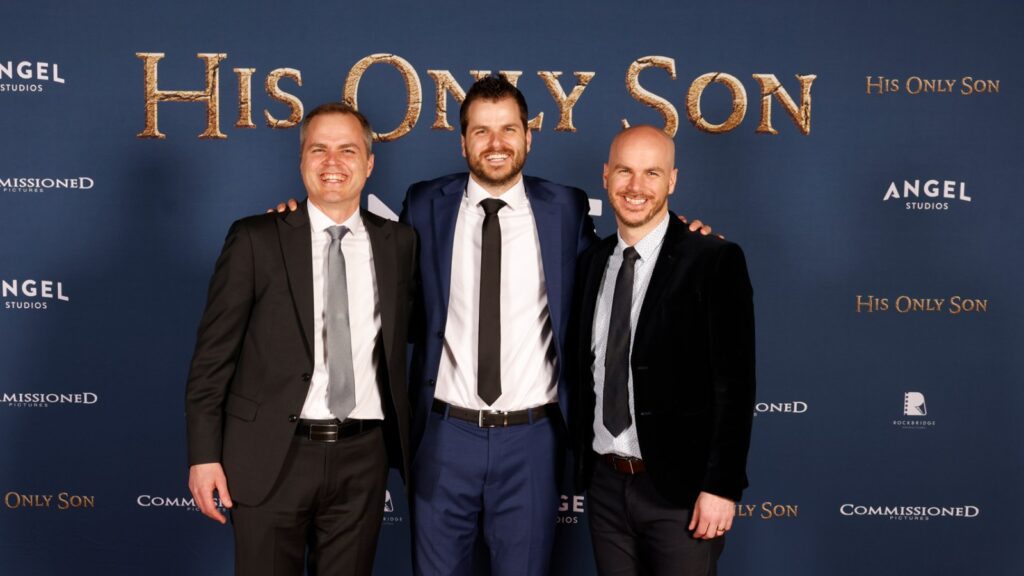Filmmakers Accuse Angel Studios of Attempted ‘Hostile Takeover’ in New Lawsuit
Angel Studios, the faith-based media company that distributed the breakout hit Sound of Freedom in 2023, is facing a lawsuit for breach of contract. It’s yet another example of creative partners claiming that the streaming and entertainment giant, which went public last fall at a valuation of $1.6 billion and has built a following among American conservatives, is in the habit of screwing over the smaller producers it works with, aggressively co-opting their original content to magnify the Angel brand.
Slingshot, the production company behind the Angel-backed animated series Young David and forthcoming companion film David, filed the complaint — obtained by Rolling Stone — in a Utah court in March. It alleges that Angel routinely ignored and violated their Content Distribution Agreement (CDA) in efforts to promote its own business that disrupted their ability to finish and market David, a musical feature that is slated for a major Thanksgiving release this year. Angel and Slingshot entered into their marketing and distribution agreement for the prequel show and movie, which are both about the biblical hero, in 2021. Two years later, the studio touted the latter as the “#1 crowd funded media project in history,” with nearly $50 million of investment. At a conference last year, Angel executives predicted it would be the top-grossing animated film of all time, which implies ticket sales in excess of $1 billion.
But Slingshot’s breach of contract suit alleges that Angel continually broke provisions of their agreement, and sometimes seemed entirely ignorant of them. The company says that at every turn, the studio appropriated and misused their intellectual property to profit at the creators’ expense. “Rather than aid Slingshot in developing the Content and help it reach wide audiences, and consistent with its longstanding pattern of breaching its distribution agreements with faith-based producers, Angel instead attempted a hostile takeover,” Slingshot claims. It contends that Angel removed its logo from David and Young David ads while using their own (making it appear Angel had developed the franchise themselves), did not ask for approval on key decisions, released shoddily dubbed versions of Young David episodes in foreign markets without permission, and refused to negotiate international distribution deals for David “if those partners were not also interested in distributing each one of Angel’s other content offerings,” seeking better upside for the studio instead of trying to secure the best offering for Slingshot.
“Angel openly rebuffed Slingshot’s attempts to resolve the disputes, going so far as to tell Slingshot that, if it did elect to pursue legal remedies, Angel would ensure that any legal dispute would be a long, drawn-out, and vindictive process,” the suit adds. Attorneys for Slingshot did not immediately return a request for additional comment. Neal Harmon, CEO of Angel Studios, tells Rolling Stone, “We’re seeing strong pre-sales with Angel’s animated biblical movie The King of Kings, which arrives in theaters for Holy Week, and we’ll look to build on what we learn to drive the launch of David after we resolve this [lawsuit].” He did not address any specific allegations in the lawsuit, nor has Angel issued a statement about the case. It’s not clear what motions they may have filed in response to Slingshot, if any.
Angel Studios sits at the center of a vast and complex business empire controlled by the Harmons, a prominent family in the Church of Jesus Christ of Latter-day Saints (Its founders include brothers Neal, Jeff, Jordan, and Daniel Harmon.) Its stated mission is to share “stories that amplify light,” which is to say religiously themed and family-friendly content. Their unusual business model, in which a streaming service and operating costs are covered in part by crowdfunding investment rounds as well as “Pay It Forward” donations (the platform’s users are told that these payments allow others to watch Angel’s movies and shows for free) drew attention when Sound of Freedom rode these campaigns to a surprising $250 million box office on a modest production budget of $14.5 million, making it one of the most successful independent films of all time.
But Sound of Freedom, while popular with conservative audiences, was also controversial. A lurid and downbeat thriller about a one-man crusade against child sex trafficking, it wildly misrepresented the sensitive issue, starred QAnon-promoting actor Jim Caviezel, and falsely mythologized its real-life subject, anti-trafficking activist Tim Ballard, who before the film’s release was quietly forced out of the advocacy organization he founded over claims of sexual misconduct. Ballard has been in legal trouble ever since, with six women suing him for sexual exploitation and bringing an additional federal lawsuit that accuses him of sex trafficking. (Ballard has maintained his innocence, countersuing the women for defamation, and Ballard’s attorney has previously denied the allegations against him to Rolling Stone.)
Nevertheless, the breakthrough film was a boon to the Angel Studios brand. Behind the scenes, however, some producers who had initially leapt at the chance to work with the company found that the Harmons weren’t the collaborators they’d hoped.
Ashley Bratcher, star of the 2019 anti-abortion biopic Unplanned, told Rolling Stone in 2023 that after she and her partners entered a distribution deal with Angel for a 1960s period piece called Pharma, they became quickly alarmed at what seemed to be a secretive network of self-dealing in which the Harmons were “paying themselves all the way around” as creators struggled to get projects off the ground. Bratcher was also concerned by what she described as Angel’s attempts to modify terms of a crowdfunding offering to give them significant majority financial stake in the film, and what she saw as misrepresentations on their website about the amounts they had raised from loyal conservative audiences. Ultimately, she was able to dissolve her deal with Angel “due to breach of contract and fraudulent inducement.”
Another contract breach cost Angel the mega-hit crowdfunded series The Chosen, about Jesus Christ and his disciples, the first three seasons of which streamed on its platform. In May, series creator Dallas Jenkins shared a video message in which he claimed that under his company’s original arrangement with Angel, they had to cover all production costs while receiving just 40 percent of viewers’ “Pay It Forward” contributions through Angel, meaning they had to work around the clock to secure their budgets in other ways. Christian leaders then established a nonprofit that allowed fans to finance The Chosen with tax-deductible donations, 100 percent of which went to the production. They also released a dedicated app that streamed the show.
Jenkins claimed that once this new and sustainable arrangement was in place, but with The Chosen still streaming on Angel, the studio began to violate the terms of their contract. This dispute eventually went to a third-party arbitrator who found that Angel was indeed in breach and ordered it to pay The Chosen‘s producers $5 million in fees and recoverable costs. The show was removed Angel’s platform but remains available on The Chosen app, as well as streamers including Amazon Prime Video, and is broadcast on the CW Network. (The Slingshot lawsuit notes that the company partnered with Angel despite some hesitation because of its success with The Chosen.)
Bitter contract negotiations are only the latest legal headache for the Harmons. They founded the company that would become Angel Studios in 2013 as VidAngel, a content-filtering company that acquired physical DVDs, then edited out graphic or family-inappropriate content, streaming the censored versions of the films to their users. Hollywood studios sued them on copyright grounds in 2016. A California jury ordered VidAngel to pay you $62 million in damages, but it instead declared bankruptcy, later emerging to pay a $10 million settlement and rebrand itself as Angel Studios.
The fate of David as Slingshot’s case proceeds is unclear. A website for the film indicates that Angel Studios has not paused crowdfunding and continues to receive donations for the film through its platform, with the minimum investment for the current round at $99. (It’s not clear whether this money is being directly funneled to Slingshot or held separately.) The offering “involves a high degree of risk including the possibility of the total loss of your investment,” according to the fine print, which also advises those interested to “consult with your advisors prior to making an investment decision.” The web page funds tracker claims that more than $55 million has been raised by more than 12,000 people, with a project goal of $60 million.
Now an established behemoth in religious entertainment, Angel certainly seems to be the Goliath to the many David-like film producers in its grasp. Still, you don’t have to be a preacher to remember how that story ends.





